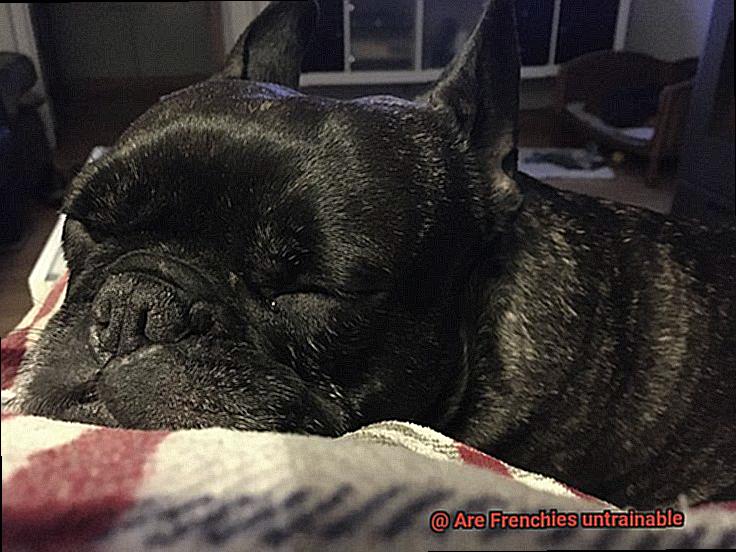Are Frenchies untrainable?
You’ve probably heard the whispers, the hushed conversations among dog lovers. They say that French Bulldogs, those adorable little bundles of joy known as Frenchies, are about as trainable as a cat herding sheep.
But hold on just a minute. Before you write off these lovable pooches as hopeless cases, we’re here to dig deep and find out the truth.
So grab your popcorn (or dog treats) because we’re about to embark on an epic journey to uncover whether Frenchies are truly untrainable or if there’s more than meets the eye.
Get ready for some jaw-dropping revelations and plenty of “aha” moments along the way. Buckle up, folks – this is going to be one wild ride.
Misconceptions about French Bulldogs and Training
Contents
- 1 Misconceptions about French Bulldogs and Training
- 2 Why Are Frenchies Perceived as Untrainable?
- 3 Overcoming the Challenges of Training a Frenchie
- 4 Positive Reinforcement Techniques for Training Frenchies
- 5 Establishing Rules and Boundaries for French Bulldogs
- 6 The Importance of Consistency when Training a Frenchie
- 7 Individual Differences in the Breed
- 8 Seeking Professional Guidance for Training a Frenchie
- 9 Conclusion
However, there is a common misconception that French Bulldogs are untrainable. As an expert in the field, I am here to debunk this myth and shed light on the truth about training these delightful companions.
Intelligence:
Contrary to popular belief, French Bulldogs are intelligent dogs. While they may not excel in certain areas of obedience training, they are more than capable of learning basic commands and behaviors. With consistent training and positive reinforcement techniques, such as treats and praise, Frenchies can surprise you with their ability to grasp new concepts.
Attention Span:
It is true that French Bulldogs can get easily distracted during training sessions. However, this doesn’t mean they are incapable of focusing. By keeping training sessions short, engaging, and free from distractions, you can help them maintain their attention and make the most of each session.
Stubbornness:
French Bulldogs do have an independent streak, but this doesn’t mean they are stubborn to the point of being untrainable. With the right approach, consistency, and positive reinforcement, Frenchies can be successfully trained and become well-behaved companions. It’s all about finding what motivates your Frenchie and using it as a reward during training.
Gentle Approach:
One important aspect of training French Bulldogs is understanding their sensitive nature. They do not respond well to harsh or forceful training methods. Positive reinforcement techniques, such as treats, praise, and rewards, work best with Frenchies as they respond positively to gentle encouragement and guidance.
Size Doesn’t Matter:
Another misconception is that because French Bulldogs are small in size, they don’t require as much training as larger breeds. This couldn’t be further from the truth. Training is essential for all dogs, regardless of their size or breed. French Bulldogs need guidance and structure to prevent behavioral issues and ensure a harmonious relationship with their owners.
House Training:
While it’s true that French Bulldogs can be more challenging to housetrain compared to some other breeds, it is not impossible. With consistency, patience, and a proper routine, French Bulldogs can be successfully house trained. Establishing a designated potty area and using positive reinforcement for desired behavior will help them understand what is expected of them.
Why Are Frenchies Perceived as Untrainable?
French Bulldogs are often perceived as untrainable due to their stubborn nature and independent thinking. However, as an expert in the field, I am here to dispel this myth and provide you with insights to successfully train your lovable Frenchie. In this blog post, we will explore the reasons behind this perception and offer practical tips for training your French Bulldog effectively.
The Stubborn Streak:
French Bulldogs do have a strong-willed and stubborn personality, but this doesn’t mean they are untrainable. It’s all about understanding their mindset and finding what motivates them. Stay patient, consistent, and use positive reinforcement techniques such as treats or praise to encourage desired behaviors.
Attention Span Challenges:
Frenchies may have a shorter attention span compared to other breeds, making it essential to keep training sessions short, engaging, and free from distractions. Incorporating interactive toys or incorporating play into training can help maintain their focus.
Sensitivity to Training Methods:
Harsh or forceful training methods can be detrimental to French Bulldogs. They respond best to positive reinforcement techniques that reward good behavior rather than punishing bad behavior. Remember to be gentle, patient, and understanding during the training process.
Social Nature:
French Bulldogs are extremely social animals who thrive on human interaction. This can make it challenging for them to concentrate solely on training tasks when there are other people or animals around. Creating a calm and quiet environment during training sessions can aid in their focus.
Health Considerations:
French Bulldogs may have certain health issues that can affect their ability to learn and follow instructions. Breathing difficulties, joint problems, or allergies may cause discomfort or pain, making it harder for them to concentrate during training. Consulting with a veterinarian is crucial to address any underlying health concerns that may impact training.
Overcoming the Challenges of Training a Frenchie

French Bulldogs, with their adorable wrinkled faces and compact bodies, have captured the hearts of many dog lovers. However, they are often considered challenging to train due to their stubborn nature and independent personality. But fear not. With the right approach and a sprinkle of patience, you can successfully train your Frenchie to be a well-behaved companion.
Embrace Positive Reinforcement Techniques
Gone are the days of dominance-based training methods. French Bulldogs respond best to positive reinforcement techniques that focus on rewarding desired behaviors. Use treats, praise, and affection as rewards to motivate and encourage your Frenchie during training sessions. This will create a positive association with learning and help them understand what is expected of them.
Consistency is Key
French Bulldogs thrive on routine and consistency. Establish a training schedule and stick to it. Consistency will help your Frenchie understand the rules and expectations, making it easier for them to learn and follow commands. Remember, patience is key – training takes time, so don’t get discouraged if progress is slow.
Break it Down
French Bulldogs have a short attention span, so long training sessions may not be effective. Instead, break down training into shorter, more frequent sessions throughout the day. This will keep your Frenchie engaged and prevent them from getting bored or distracted.
Clicker Training for Clear Communication
Consider using clicker training or other marker-based techniques with your Frenchie. Clickers provide a clear and distinct sound that signifies when your dog has performed a desired behavior correctly. This helps establish clear communication between you and your Frenchie, making training more effective.
Seek Professional Help if Needed
If you’re struggling with training your Frenchie, don’t hesitate to seek professional help. A certified dog trainer can provide guidance tailored to your Frenchie’s specific needs and help you overcome any training challenges you may be facing.
Success Stories from Frenchie Owners
Now that you know some strategies for training your Frenchie, let’s take a moment to hear from other Frenchie owners who have successfully trained their dogs. These stories serve as inspiration and remind us that with dedication and consistency, we can overcome any training challenges.
Positive Reinforcement Techniques for Training Frenchies
Frenchies, those adorable little bundles of joy, can sometimes be a handful when it comes to training. But fear not, my fellow Frenchie lovers. I’m here to share with you the importance of using positive reinforcement techniques when training these lovable goofballs.
Rewards Galore: Treats, Treats, and More Treats.
As I’m sure you already know, Frenchies are food-motivated. That means treats are their currency of choice when it comes to learning new tricks or commands. So be armed with a pocketful of tasty treats and watch as your Frenchie’s eyes light up with excitement when they successfully complete a command. Remember to praise them in your sweetest voice and deliver that treat pronto.
Verbal Praise: Woof-errific.
In addition to treats, Frenchies also thrive on verbal praise. They absolutely lap up those “good boy” or “good girl” accolades like a thirsty pup at a water bowl. So don’t hold back on the praise – let it flow like a river of love. Your Frenchie will eat it up and be eager to please you even more.
Playtime is Paw-some: Toys as Rewards
Frenchies love a good play session, so why not use it as a reward during training? When your Frenchie nails a command, whip out their favorite toy and indulge them in some interactive playtime. This will not only reinforce the desired behavior but also make training sessions more enjoyable for both of you.
Consistency is Key: Like Clockwork
Consistency is crucial when it comes to positive reinforcement training. Make sure to reward your Frenchie every time they exhibit the desired behavior, especially in the early stages of training. This will help them understand what is expected of them and reinforce the connection between the behavior and the reward.
Short and Frequent Sessions: Keep It Snappy

Frenchies have the attention span of a squirrel on caffeine, so keep training sessions short and snappy. Aim for around 5-10 minutes per session to maintain their focus and prevent them from getting bored or frustrated. And remember, frequent training sessions throughout the day will give your Frenchie plenty of opportunities to practice and reinforce their newly learned behaviors.
Timing is Everything: Don’t Miss a Beat
When it comes to positive reinforcement, timing is everything. Make sure to deliver the reward immediately after your Frenchie exhibits the desired behavior. This will help them make a clear connection between their action and the reward, reinforcing their understanding of what is being reinforced.
Establishing Rules and Boundaries for French Bulldogs
French Bulldogs are known for their adorable and affectionate nature. However, they can also be stubborn and independent, which can make training a bit challenging. But fear not, with the right approach and consistent training, you can establish effective rules and boundaries for your Frenchie.
Consistency is key when it comes to training any dog breed, but especially so for French Bulldogs. These little furballs thrive on routine and predictability, so it’s important to set clear expectations and stick to them. From the moment you bring your Frenchie home, start by setting basic rules and boundaries. This includes things like where they are allowed to go in the house, what furniture they can or cannot access, and what behaviors are acceptable or not.
Positive reinforcement is an effective training method for French Bulldogs. Instead of using punishment or force, focus on rewarding desired behaviors with treats, praise, or playtime. This creates a positive association and motivates them to repeat those behaviors. Remember to always reward immediately after the desired behavior occurs, so they understand what they are being rewarded for.
Socialization is another crucial aspect of establishing rules and boundaries for French Bulldogs. Frenchies can be prone to separation anxiety and aggression if not properly socialized. Expose them to different people, animals, and environments from a young age to help them become well-rounded and confident dogs. This will also help them feel more comfortable in various situations.
To establish effective rules and boundaries, it’s important to establish yourself as the pack leader in your Frenchie’s eyes. Dogs are pack animals by nature, and they look up to their leader for guidance and direction. Show your Frenchie that you are in control by consistently enforcing rules, being firm yet gentle, and providing clear cues. This will help them understand their place in the family hierarchy.
Training a French Bulldog requires patience and persistence. They may take longer to learn certain commands or behaviors compared to other breeds, but it doesn’t mean they are incapable of learning. Stay positive, break down tasks into smaller steps if needed, and celebrate small victories along the way. Remember, training is a journey, not a destination.
If you’re struggling with training your Frenchie or feel like you’ve hit a roadblock, don’t hesitate to seek professional help. A professional dog trainer can provide guidance, tailored techniques, and additional support to help you and your Frenchie succeed in training. They have the experience and knowledge to address specific challenges and tailor their approach to your Frenchie’s needs.
The Importance of Consistency when Training a Frenchie
Training a Frenchie can be both challenging and rewarding. French Bulldogs are known for their stubbornness and independent nature, but with consistent training methods, they can become well-behaved companions. In this article, we will explore the importance of consistency when training a Frenchie and provide practical tips to help you achieve success.
Establish Clear Rules and Boundaries:
Setting clear rules and boundaries from the beginning is crucial when training a Frenchie. Consistently enforcing these rules helps your Frenchie understand what is expected of them and what behaviors are not acceptable. For example, if you don’t want your Frenchie to jump on the furniture, be consistent in enforcing this rule every time they attempt to do so.
Use Consistent Commands and Cues:
Using the same commands and cues throughout the training process is essential for effective communication with your Frenchie. Consistently using specific words or hand signals for desired behaviors helps your Frenchie learn and understand what you are asking of them. Whether it’s “sit,” “stay,” or “come,” using consistent commands will make training more efficient.
Establish a Regular Training Routine:
Consistency in the timing and frequency of training sessions is key. Establishing a regular training routine helps your Frenchie know what to expect and creates a structured learning environment. Short, frequent training sessions are more effective than long, sporadic ones. Dedicate regular time each day for training and be consistent with the duration of these sessions.
Reinforce Desired Behaviors:
Consistently reinforcing desired behaviors is crucial in training a Frenchie. Rewarding good behavior with treats, praise, or playtime helps reinforce those behaviors and encourages your Frenchie to continue behaving in that way. Conversely, consistently ignoring or redirecting unwanted behaviors helps discourage them.
Use Positive Reinforcement Methods:
Consistency in using positive reinforcement methods is key to successful training. Positive reinforcement, such as rewards and praise, is more effective and humane than punishment-based techniques. Consistently rewarding desired behaviors helps build a strong bond between you and your Frenchie and makes training a positive and enjoyable experience for both of you.
Ensure Consistency among Household Members:
Consistency should extend to all members of the household. It’s important that everyone who interacts with your Frenchie follows the same training methods and rules. Inconsistent training or conflicting commands can confuse your Frenchie and make training more challenging. Ensure that everyone in the household is on board with the training plan and consistently reinforces the desired behaviors.
Individual Differences in the Breed
We all know that training our adorable Frenchie companions can sometimes feel like cracking a secret code. But fear not, because I’m here to shed some light on the individual differences in the breed that may affect their trainability. Let’s dive in.
- Stubbornness: Ah, the notorious stubbornness of French Bulldogs. These little cuties have a mind of their own, and sometimes that means they’re less responsive to training commands. But don’t throw in the towel just yet. With positive reinforcement techniques and consistency, you can break through that stubborn exterior and unleash the obedient side of your Frenchie.
- Energy Level: While French Bulldogs aren’t known for being high-energy dogs, they still need their exercise and mental stimulation. A tired Frenchie is a focused Frenchie, so make sure to give them plenty of physical activity before training sessions. Get those zoomies out of their system, and watch as their attention span improves.
- Socialization: Socialization is key to a well-trained Frenchie. Early and consistent exposure to other dogs, animals, and people will help build their confidence and reduce any fear or anxiety that may hinder their learning process. Plus, positive experiences during socialization will contribute to a more well-rounded and obedient Frenchie.
- Intelligence: French Bulldogs are generally intelligent dogs, but just like humans, each Frenchie has their own unique level of smarts. Some may catch on quickly to training commands, while others may need a bit more time and repetition. Be patient and understanding with your furry friend as they navigate the learning process.
Remember, every Frenchie is different, so tailor your training methods to suit their individual needs. Consistency is key, so establish clear rules and boundaries from day one. And don’t forget to shower your Frenchie with praise and treats when they do well – positive reinforcement goes a long way.
Seeking Professional Guidance for Training a Frenchie
Training a French Bulldog can be a challenging endeavor due to their stubborn and independent nature. However, with the right guidance, it is possible to train them effectively. Seeking professional help can make a significant difference in achieving successful results. In this blog post, we will explore the importance of seeking professional guidance when training a Frenchie.
Understanding the Unique Needs of French Bulldogs:
French Bulldogs have their own set of temperament and behavior patterns that require specific training methods. Professional trainers have the knowledge and experience to understand these needs, allowing them to tailor their training techniques accordingly.
Addressing Behavioral Issues:
Professional trainers are equipped to identify and address behavioral issues that may arise during training. Whether it’s excessive barking, aggression, or separation anxiety, trainers can develop effective strategies to modify or eliminate these behaviors.
Positive Reinforcement Techniques:
One of the key advantages of seeking professional guidance is trainers’ use of positive reinforcement techniques. By rewarding desired behaviors and redirecting unwanted ones, trainers motivate and shape desired behaviors effectively.
Personalized Training Plans:
Professional trainers provide personalized training plans based on your Frenchie’s individual needs and learning style. This tailored approach increases the chances of success and ensures that your Frenchie receives the most effective training possible.
Valuable Advice and Tips:
In addition to training techniques, professional trainers offer valuable advice on various aspects of Frenchie care and training. From socialization techniques to leash and crate training, their expertise helps navigate any challenges encountered during the training process.
Training a Frenchie requires patience, consistency, and the right approach. Seeking professional guidance provides the necessary expertise to tackle the unique challenges that come with training French Bulldogs.
With their knowledge, experience, and personalized approach, professional trainers can help unlock your Frenchie’s obedient potential. Remember, seeking professional guidance doesn’t mean you can’t train your Frenchie on your own. It simply ensures that you’re using the most effective methods.
So, don’t hesitate to seek professional help and watch your Frenchie transform into a well-behaved and happy companion.
f3XueAlb5Q4″ >
Conclusion
French Bulldogs, often affectionately called Frenchies, have gained a reputation for being stubborn and difficult to train. However, this notion couldn’t be further from the truth. While it’s true that Frenchies may have a bit of an independent streak, they are by no means untrainable. In fact, with the right approach and consistency, these adorable little dogs can excel in obedience training.
One common misconception about Frenchies is that their stubbornness makes them resistant to learning commands. But in reality, their perceived stubbornness is more likely due to their sensitive nature and desire for positive reinforcement. French Bulldogs thrive when they feel loved and rewarded for their efforts.




